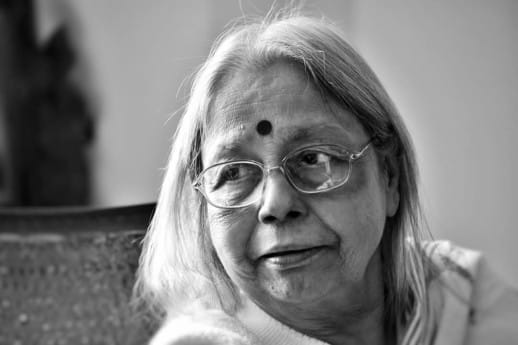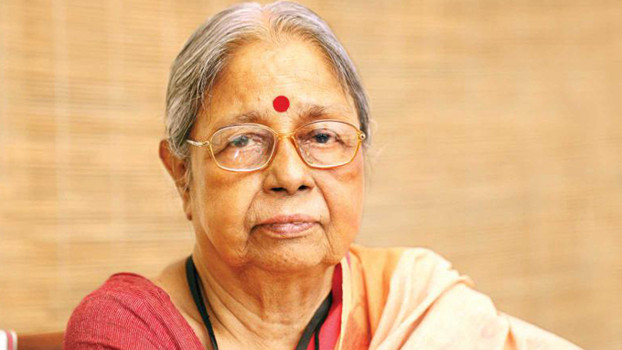Sanjida Khatun: Different and defiant

It is not easy to draw a portrait of Sanjida Khatun as she is a person with many identities and a lady with 10 hands, like the dashabhuja of Bangla myth. She is a singer par excellence; her renderings of Tagore songs are those of a maestro; she holds a special place along with Nilima Sen, Kanika Bandyopadhyay, Rajeshwari Dutta, and others. Usually, singers have no claim to scholarship on Tagore's songs, his music, literary works, or philosophy of life. From that perspective, Sanjida Khatun holds a special place among the Tagore scholars and her book Rabindra Sangiter Bhabasampad (The Richness of Tagore's Songs) has become a classic in its own right. She embodies the combination of a singer and a scholar, a rare feat that distinguishes her from all others in her respective field.
These two achievements are enough to define one as an accomplished person with a place among successful ones—but Sanjida Khatun has performed other tasks of importance. She was a professor of Bangla literature at government colleges and later joined Dhaka University. She left behind many students whom she had introduced to literature. As an academic, she stands tall among many with her analytical mind and eloquent way of presentation. In 1978, she earned a PhD from Visva Bharati, the university of Tagore. In the mid-1950s, she completed her MA in Bangla literature at the same university, which was highly exceptional at that time. As an academician, she continued her pursuit of new knowledge and earned a Doctor of Literature degree from Visva Bharati with her research on poetics based on phonetics, pronunciation and transformation—meaning of words in poetry. This highly original work was lauded by scholars when it was published from India.
Sanjida Khatun, the scholar, has penned many other books on literature, culture and society. Most of these books are based on Tagore's song. It is through songs and music that Sanjida Khatun observed the world around her. Music nourished her soul and drove her to embrace the challenges of life, both personal and social/national. But more than anything else, Sanjida Khatun was a cultural interlocutor, a defender of Bangalee national identity. From her college days, she was an activist, took part in the language movement, practised music, joined in all kinds of musical events and started a life-long journey with Tagore songs.
Surprisingly, she never received any formal lesson in music. She was raised in a liberal, secular, enlightened and musical environment. Her father Dr Kazi Motahar Hossain, a great scholar and professor of mathematics at Dhaka University, was one of the key organisers of the "Buddhir Mukti" or "Freedom of Intellect" movement of 1920s in Dhaka. A friend of Kazi Nazrul Islam, his literary writings have earned a place of its own. He played Esraj and promoted music in the family. From early life, his daughter Sanjida Khatun distinguished herself as a cultural activist and a performer with promise. She returned from Shantiniketan with a master's degree and as an accomplished singer. It is not that she studied music at Shantiniketan, but as she said, music was always in the air and environment of Shantiniketan. At that time, the Pakistani ruling coterie did their best to confront the national struggle, both politically and culturally. This culminated in the imposition of military rule in 1958, all political parties were banned, civil rights curtailed, no political meeting or activity were allowed. It was a long era of darkness that was shattered in 1961 by people's initiative to observe Tagore's birth centenary by organising public programmes with songs and dance-drama. Tagore centenary was celebrated in other towns like Chittagong, Khulna, Sylhet, Rajshahi etc. Soon after the organisers in Dhaka felt the urge to keep the cultural activities alive and Chhayanaut was established with poet Sufia Kamal at the helm and Sanjida Khatun as its motor. Chhayanaut established a musical school to raise new generations of artists with a commitment to uphold the rich tradition of Bangalee culture. Sanjida Khatun dedicated herself to teaching, learning, and inspiring disciples to be skilled singers with commitment to serve the people in times of crisis. Chhayanaut, as a seat of learning and centre of public performance, ushered in a new upsurge in the cultural arena, especially with the early morning celebration of Bangla New Year under the banyan tree at Ramna Park. First held in 1967, this became the symbol of Bangalee people's resistance against Pakistani domination by upholding their cultural identity. In a short time Pahela Baishakh turned to be the largest secular festival of the nation.
Since 1980, with the establishment of Rabindrasangeet Sammilon Parishad she embarked on a journey to take music lessons to the districts and small towns all over the country. She conducted workshops, teaching and touching the hearts of young aspirants and made a lasting impact. The Parishad, with more than 60 branches all over the country, organises annual conference alternatively in a district town, which exemplifies her commitment to the spread of cultural practices.
In 2001, an extremist religious group violently attacked the Baishakh festivities in the park, causing the death of many innocent spectators. The brutality caused deep pondering in Sanjida Khatun's mind, and she decided to add a new chapter in her work. She and her colleagues started a formal school with a medley of education and culture based on learning with pleasure. Nalanda added a new dimension to the concept and practice of education.
Sanjida Khatun embraced other tasks to rejuvenate the society with meaningful cultural practices. She headed the Bangladesh Bratachari Samity to organise camps promoting the practice of Bratachari. Pronunciation and recitation are other areas of her interest. She was a master tutor in this art and conducted workshops in Kanthashilon. Various domains of Sanjida Khatun's work represent the breadth of her philosophy and praxis of life.
In totality, she dedicated herself to building a society rooted in its culture and tradition, imbued with a secular liberal humanist spirit whereby to be a Bangalee meant to be universal also. She aspired to create a generation that could steer through the complexities of the modern world with a firm footing in its own culture and tradition. All her life, she worked with 10 hands, excelling in various acts, and enriching us with her dedicated, multifaceted contribution.
She is part of the cultural history of Bengal and Bangladesh and will remain a source of inspiration for nation-building.
Mofidul Hoque is an author, researcher and publisher, and a trustee of the Liberation War Museum.
Views expressed in this article are the author's own.
Follow The Daily Star Opinion on Facebook for the latest opinions, commentaries and analyses by experts and professionals. To contribute your article or letter to The Daily Star Opinion, see our guidelines for submission.



 For all latest news, follow The Daily Star's Google News channel.
For all latest news, follow The Daily Star's Google News channel. 

Comments